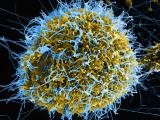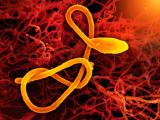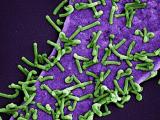Public health officials have a new tool to combat Ebola, which kills about half of the people it infects: a global vaccine stockpile.
In a news release today, the International Coordinating Group (ICG) on Vaccine Provision said the effort will allow countries, with the support of humanitarian organizations, to mitigate future outbreaks quickly. This is the ICG's fourth stockpile, following ones created to combat yellow fever, meningitis, and cholera outbreaks.
The ICG consists of the World Health Organization (WHO), United Nations Children's Fund (UNICEF), International Federation of Red Cross and Red Crescent Societies (IFRC), and Médecins Sans Frontières (a.k.a., Doctors Without Borders or MSF). Gavi, the Vaccine Alliance, provided additional funding.
ICG plans to scale up doses
Already, 6,890 doses of Ebola vaccine are available, but the ICG will work to increase supply to 500,000 doses as recommended by the Strategic Advisory Group of Exports on Immunization. Depending on vaccine development, ICG says this could take between 2 and 3 years.
Stockpiles can contain more than one vaccine—a 2013 WHO report outlining the then-new cholera stockpile included both Dukoral and Shanchol—but for now, Merck's Ervebo, the only Ebola vaccine approved by the US Food and Drug Administration, is the sole product.
"The creation of an Ebola vaccine stockpile under the ICG is a positive step," Natalie Roberts, MD, MSF program manager, said in the press release. "An Ebola vaccine stockpile can increase transparency in the management of existing global stocks and the timely deployment of the vaccine where it's most needed, something MSF has called for during recent outbreaks in the Democratic Republic of Congo [DRC]."
Aiming for fast vaccine delivery to countries
Outbreaks such as the 2014-16 West African epidemic and more recent ones in the DRC have shown the world just how much it needs an Ebola vaccine, but as the ICG notes, Ebola outbreaks are fairly rare and unpredictable, so the vaccine lacks a natural market.
By creating a stockpile of the vaccine, at-risk populations and the healthcare and frontline workers working with them will be able to have access when the need arises.
Similar to ICG's other stockpiles, national bodies can fill out an application outlining the outbreak, past immunization coverage, budget, and initial vaccination plans and expect a response from the ICG within 48 hours. If the request is granted, the allocation will leave Switzerland, where the stockpile is managed by UNICEF, and arrive ideally in a week's time.
The vaccine will be transported using ultra-cold packaging provided by the manufacturer. For Ervebo, that means it must be stored away from light at -112°F to -76°F. When thawed for use, it can sit at room temperature for 4 hours or placed back into a refrigerator for no more than 2 weeks.
"The COVID-19 pandemic is reminding us of the incredible power of vaccines to save lives from deadly viruses," said Tedros Adhanom Ghebreyesus, PhD, WHO director-general, in the press release.
"Ebola vaccines have made one of the most feared diseases on earth preventable. This new stockpile is an excellent example of solidarity, science, and cooperation between international organizations and the private sector to save lives."



















